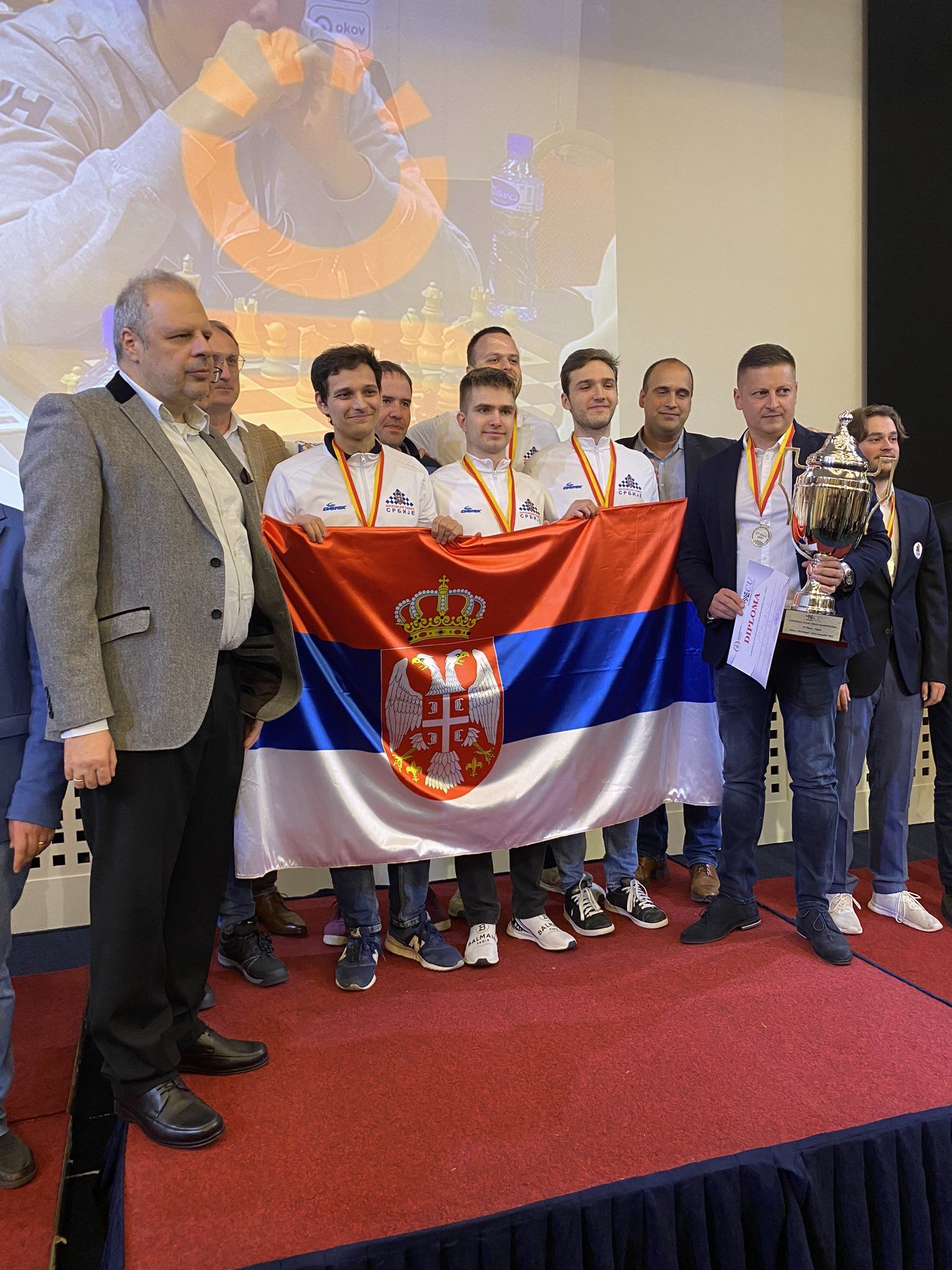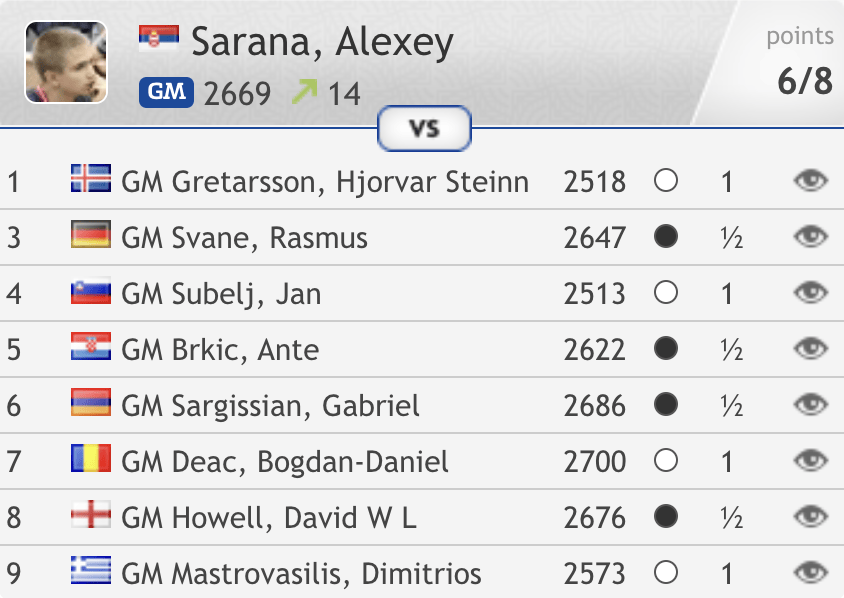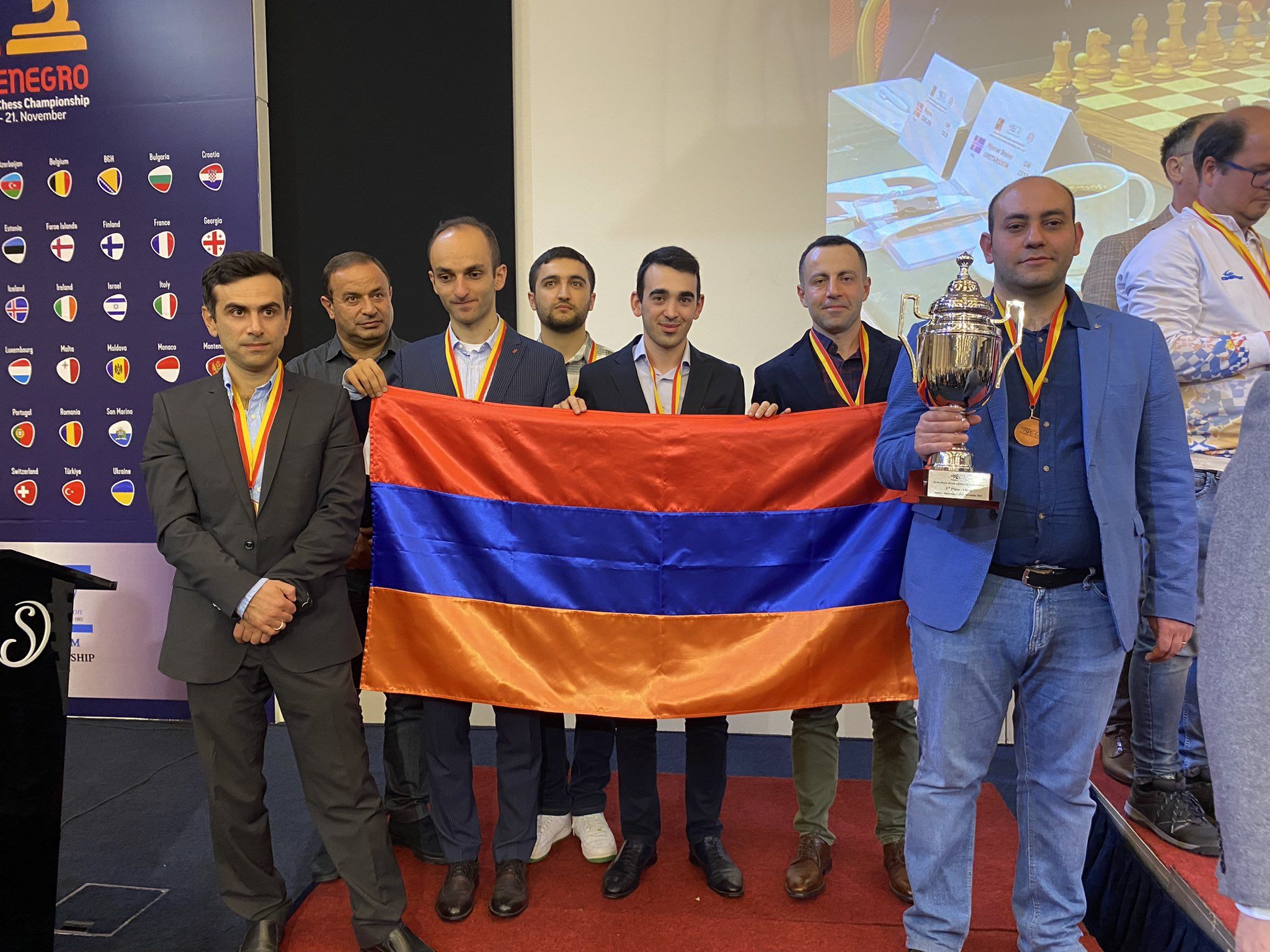Serbia, Bulgaria Win Euro Team Championship; Carlsen Takes Individual Gold
Tenth-seed Serbia has won the 2023 European Team Chess Championship after finishing a single tiebreak point ahead of Germany, who took silver despite remaining unbeaten and winning their head-to-head clash. Team chess specialists Armenia took bronze, while GM Magnus Carlsen won the individual gold medal on Board 1. Bulgaria, who needed a wildcard to play, took gold in the Women’s section, ahead of Azerbaijan (silver) and France (bronze).
The European Team Chess Championship in Budva, Montenegro is over. Let’s take a look at seven conclusions:
1. Serbia Justified Their Status As A Dark Horse

“Serbia has become a dark horse to win in Budva with the addition of GMs Alexey Sarana and Alexandr Predke,” we noted in our first report on the tournament, and so it proved, as the 10th-seeded team won seven out of nine matches to claim the title.
Final Standings Open (Top 12)
| Rk. | Seed | FED | Team | Matches | + | = | – | Points | TB |
| 1 | 10 | Serbia | 9 | 7 | 1 | 1 | 15 | 228 | |
| 2 | 3 | Germany | 9 | 6 | 3 | 0 | 15 | 227 | |
| 3 | 5 | Armenia | 9 | 5 | 3 | 1 | 13 | 196.5 | |
| 4 | 11 | Poland | 9 | 5 | 2 | 2 | 12 | 179.5 | |
| 5 | 13 | Czech Republic | 9 | 5 | 2 | 2 | 12 | 165 | |
| 6 | 4 | England | 9 | 4 | 3 | 2 | 11 | 204.5 | |
| 7 | 7 | France | 9 | 5 | 1 | 3 | 11 | 196.5 | |
| 8 | 2 | Romania | 9 | 4 | 3 | 2 | 11 | 193.5 | |
| 9 | 12 | Hungary | 9 | 4 | 3 | 2 | 11 | 185.5 | |
| 10 | 14 | Croatia | 9 | 4 | 3 | 2 | 11 | 177.5 | |
| 11 | 23 | Georgia | 9 | 5 | 1 | 3 | 11 | 169.5 | |
| 12 | 17 | Greece | 9 | 5 | 1 | 3 | 11 | 168.5 |
The two former Russian players were in top form, with Predke only spoiling a rock-solid event on top board by trying to play for a win in the final round when he thought his team was in trouble. Sarana did Sarana things, scoring 100% with the white pieces for a gold medal on board two and the second-highest rating performance of anyone in Budva (2810).

It was Sarana’s defense with Black that helped Serbia to a win over co-leaders England in the penultimate round after GM Velimir Ivic (a gold medalist on board five) gave Serbia the lead by beating GM Ravi Haria.
GM David Howell was one, and then two pawns up, with Carlsen noting he’d made a “Grind Like A Grandmaster” Chessable course with the English GM and, “I was thinking, David is loving this!”

The fun stopped, however, when Sarana spotted a trick to end the game.
The final round was mayhem, with Predke by no means wrong to think his teammates had problems. In the end, however, they all won!

GM Aleksandar Indjic was the hero, as he managed to turn around a lost position against GM Stamatis Kourkoulos-Arditis. The finish was wild.
The victory was particularly sweet for Sarana, who becomes the only player to win the European individual and team championships in the same year.
2. Germany Miss Out Amid Tiebreak Controversy
It was heartbreak for Germany, who came as close as it’s possible to come to repeating their feat in 2011 and winning the European title. Germany also won its final two matches, over France and Croatia, to tie Serbia on 15 points. The team didn’t lose a match, and had beaten Serbia in the head-to-head encounter.

How would the teams be separated? It came down to the infamous “Olympiad-Sonneborn-Berger tiebreak”, which is calculated by multiplying your score in each match by the final score of your opponent. That’s how the 2023 European champions were decided by an otherwise low-stakes matchup, Turkey vs. Iceland, and a game that lasted 111 moves.
If Ali wins Rook + Knight vs. Rook it seems Germany would take gold, but otherwise it goes to Serbia! https://t.co/fMfpBGY24t #ETCC2023 pic.twitter.com/lKrzsJTdkm
— chess24.com (@chess24com) November 20, 2023
A win for Black and Turkey would defeat Iceland, who had been beaten 4-0 by Serbia. That would cost Serbia points, but in the end the match was a draw, and Serbia won the title by a single tiebreak point.
Herzlichen Glückwunsch an Vincent Keymer, Rasmus Svane, Dmitrij Kollars, Matthias Blübaum, Alexander Donchenko und Jan Gustafsson zur Vize-Europameisterschaft!#etcc2023 pic.twitter.com/8voIRvILpT
— Deutscher Schachbund (@Schachbund) November 20, 2023
Not for the first time, some observers complained that a system where the players and fans need to consult spreadsheets is less than ideal.
Chess must be the only sport, where we sit with spread-sheet to get an idea who have won. And all eyes are on other match, which will decide the championship on tiebreaks.
Congratulations to who have won!
And maybe let´s have a system with a final like other sports? 🤔 https://t.co/O0a58YBiQm
— Peter Heine Nielsen (@PHChess) November 20, 2023
Still, it had been an excellent event for Germany, and for GM Vincent Keymer in particular. The 19-year-old has climbed into the world top-15.
3. The Armenian Miracle Continues

Bronze medals went to Armenia, the land-locked country of under three million people that continues to defy the odds to win team medals, even after their star player, GM Levon Aronian, switched to the U.S. Chess Federation. They lost just one match, to Germany, and their European medals come a year after Armenia pulled off the even more impressive feat of finishing runner-up at the 2022 FIDE World Chess Olympiad in Chennai.
4. Carlsen Still Has Chess Goals
Carlsen skipped the final round, so that his tournament ended with a win over GM Jorden van Foreest, the world number-one’s first pairing against a 2700-opponent in 18 games.

In explaining why he didn’t play the final round for Norway, Carlsen revealed he’s still chasing firsts:
“The reasons are mostly selfish, I would say. The first and most important reason is that unless Saric wins I will get first place on board one, and I’ve never won an individual gold medal in European Teams or the Olympiad, so that would be something quite important to me. The second reason was that I was tired.”
I’ve never won an individual gold medal in European Teams or the Olympiad, so that would be something quite important to me.
—Magnus Carlsen
Watch the full interview:
Carlsen’s calculations were correct, and he did win the gold medal on board one with a tournament-best 2827 rating performance. It was even enough for him to pick up 0.6 rating points.
“I also wanted to end on a high!” said the former world champion, and the last game was certainly that. The beautiful “Karpovian” effort is our Game of the Day, with analysis by GM Rafael Leitao.
Carlsen’s year of classical chess had set some unwanted personal anti-records.
That was likely Carlsen’s last classical game in 2023. 63 games total, the highest since 2019 (79). His score is +30 =27 -6, the lowest score percentage wise (69 %) since 2018.
Even more significant: His 2023 rating performance (2787) is below 2800 for the first time since 2008. https://t.co/TQtQQBPGOk
— Tarjei J. Svensen (@TarjeiJS) November 20, 2023
But at least it was over, with Carlsen’s thoughts now turning to the Champions Chess Tour Finals in Toronto and then the World Rapid and Blitz in Uzbekistan.
“I’m very happy not to play classical chess! I played so many games. Now I have two weeks’ vacation and then I’ll play some rapid and blitz for the rest of the year. I already woke up very nice, relaxed today, knowing that I didn’t have to play!”
5. Bulgaria Defied The Odds
The victory of number-five seeded Bulgaria in the Women’s European Team Championship had shades of how GM Ding Liren became world champion. Ding didn’t qualify for the Candidates, hadn’t played the number of games needed to even be eligible to qualify, and then didn’t win the Candidates—but the stars aligned so that he played a world championship match anyway.
Bulgaria isn’t a member of the European Chess Union, after a controversy stretching back eight years saw them expelled, but they were given a wildcard to play anyway. Then one of their top performers, WGM Viktoria Radeva, fell so ill during round six that she ended up in hospital and didn’t play another game. Nothing could stop Bulgaria, however, since after a slow start—two draws in the first three matches—the team won the remaining six clashes to finish in clear first place.
Congratulations to the Winners of the European Women’s Chess Championship 2023! 👏 #ETCC2023
🏆Bulgaria 🇧🇬, 16 match points
🥈Azerbaijan 🇦🇿, 15 match points
🥉France 🇫🇷, 12 match pointsFinal rankings: https://t.co/zpEPGz0lds pic.twitter.com/OOjNMyQNqD
— European Chess Union (@ECUonline) November 20, 2023
Final Standings Women (Top 13)
| Rk. | Seed | FED | Team | Games | + | = | – | Points | TB |
| 1 | 5 | Bulgaria | 9 | 7 | 2 | 0 | 16 | 236 | |
| 2 | 2 | Azerbaijan | 9 | 7 | 1 | 1 | 15 | 227 | |
| 3 | 6 | France | 9 | 5 | 2 | 2 | 12 | 210 | |
| 4 | 4 | Ukraine | 9 | 5 | 2 | 2 | 12 | 199 | |
| 5 | 19 | Greece | 9 | 5 | 2 | 2 | 12 | 181.5 | |
| 6 | 8 | Poland | 9 | 6 | 0 | 3 | 12 | 175.5 | |
| 7 | 3 | Germany | 9 | 4 | 3 | 2 | 11 | 178 | |
| 8 | 15 | Serbia | 9 | 5 | 1 | 3 | 11 | 171.5 | |
| 9 | 11 | Switzerland | 9 | 4 | 3 | 2 | 11 | 169.5 | |
| 10 | 1 | Georgia | 9 | 4 | 2 | 3 | 10 | 180 | |
| 11 | 7 | Armenia | 9 | 4 | 2 | 3 | 10 | 174.5 | |
| 12 | 9 | Spain | 9 | 5 | 0 | 4 | 10 | 169 | |
| 13 | 13 | England | 9 | 4 | 2 | 3 | 10 | 138 |
That run included Bulgaria beating the two pace-setters, Azerbaijan and France, in consecutive rounds, and even in the final round things came down to the wire. Azerbaijan briefly looked set to snatch gold before WIM Gergana Peycheva managed to turn around a lost position and beat IM Lela Javakhishvili. France took bronze.
Congratulations to Bulgaria on winning the Women’s #ETCC2023 after Gergana Peycheva won a final game from a lost position to defeat top seeds Georgia! https://t.co/FFw2OJbXrQ pic.twitter.com/gRGy9PcSRw
— chess24.com (@chess24com) November 20, 2023
IM Nurgyul Salimova, who won four games in a row near the end, needn’t have worried.
Nurgyul Salimova: “The World Cup I finished 2nd, the Club Cup I finished 2nd, and now I’m scared to finish 2nd!” #ETCC2023 pic.twitter.com/L7L7Sni36a
— chess24.com (@chess24com) November 20, 2023
This time it was 1st.
European champions!!! 🇧🇬❤️💪🏻 pic.twitter.com/HoqLYa6ndp
— Nurgyul Salimova (@nurgyulll1) November 20, 2023
6. Women Stars Take Turns To Gain GM Norms
There were more winning streaks in the Women’s event. We reported that Greek IM Stavroula Tsolakidou had made a GM norm in round seven after winning four games in a row. She then went on to lose to Azerbaijani IM Gunay Mammadzada, whose four wins in five games gave her a GM norm herself. Perhaps inevitably, there was a final twist!
INJAC DOES IT!!!!!!
Teodora Injac is the FIRST SERBIAN WOMAN IN HISTORY to earn a GM NORM (!!). 🇷🇸🥳🥳🥳
She’s also the 3rd #womeninchess to make a GM norm in this tournament!!! 🤯🤯🤯https://t.co/eIzZ1mti6u
📷: Paul Meyer-Dunker#chess #womeninchess #ETCC2023 https://t.co/O4NpusIXP4 pic.twitter.com/mInm2KcoBA— Women’s Chess Coverage (@OnTheQueenside) November 20, 2023
7. It’s Tough To Be A Favorite
The absence of Russian and Ukrainian teams had made the Azerbaijan men’s team clear favorites to take gold, but instead they crashed and burned—suffering a stunning four defeats and bleeding over 50 rating points between them. GM Teimour Radjabov‘s 19-move loss to GM Nikolas Theodorou was their event in a nutshell, as the top seeds finished 18th.
Second-seeded Romania also failed to push on after not losing a single game in the first five rounds, though sometimes the margins were small. Any lingering medal hopes were ended when, in a promising position, GM Bogdan-Daniel Deac managed to lose on time, conceding defeat against Croatia.
Ante Brkic: “I played my worst game of the tournament!” Ante explains Deac tried to play 40…Rb8 with 2 seconds to spare, but toppled his rook, tried to put it back again, and lost on time#ETCC2023 pic.twitter.com/jlnFnZ8yTf
— chess24.com (@chess24com) November 19, 2023
It was the same story in the Women’s section for Georgia, who began as the clear top seed with a gaping 79-point gap in average rating to second-seeded Azerbaijan. They’d finished runners-up to Russia in the last three European Team Championships, but now without Russia they went on to lose three matches and finish in 10th place—sometimes chess is just impossible to predict!
The 2023 European Team Chess Championship is a nine-round team tournament taking place in Budva, Montenegro, during November 11-20. All the European chess federations can field a team in the Open and Women’s sections; matches are played on four boards. The time control is classical, with 90 minutes for 40 moves, 30 minutes to the end of the game, and a 30-second increment from move one.
Previous Coverage:
Read More:Serbia, Bulgaria Win Euro Team Championship; Carlsen Takes Individual Gold

